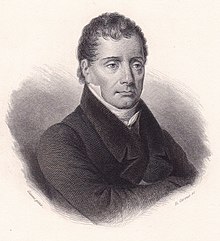Royer-Collard
| Pierre Paul Royer-Collard | |
|---|---|
 |
|
| President of the French Chamber of Deputies | |
|
In office 25 May 1828 – 16 May 1830 |
|
| Preceded by | Auguste Ravez |
| Succeeded by | Casimir Perier |
| Member of the French Chamber of Deputies | |
|
In office 25 August 1815 – 5 July 1831 |
|
| Constituency | Marne |
| Member of the Council of Five Hundred | |
|
In office 21 March 1797 – 4 September 1797 |
|
| Constituency | Marne |
|
Councillor of the Paris Commune for the 4th arrondissement |
|
|
In office 20 July 1789 – 10 August 1792 |
|
| Personal details | |
| Born |
21 June 1763 Sompuis, Champagne, France |
| Died | 2 September 1845 (aged 82) Châteauvieux, Loir-et-Cher, France |
| Nationality | French |
| Political party |
Girondin (1791–1793) Clichyen (1794–1797) Legitimist (1797–1815) Doctrinaire (1815–1831) |
| Spouse(s) | Augustine de Forges de Chateaubrun |
| Children | 4 children |
| Alma mater | Saint-Omer College |
| Profession | Lawyer, teacher, philosopher |
| Religion | Roman Catholicism |
Pierre Paul Royer-Collard (21 June 1763 – 2 September 1845) was a French statesman and philosopher, leader of the Doctrinaires group during the Bourbon Restoration (1814–1830).
He was born at Sompuis, near Vitry-le-François (in modern-day Marne), the son of Anthony Royer, a small businessman. His mother, Angélique Perpétue Collard, was a woman of strong character and great piety. Pierre Paul Royer was sent at twelve to the college of Chaumont of which his uncle, Father Paul Collard, was director. He subsequently followed his uncle to Saint-Omer, where he studied mathematics. At the outbreak of the French Revolution, to which he was passionately sympathetic, he was practising at the Parisian bar. He was returned by his section, the Island of Saint-Louis, to the Commune, of which he was secretary from 1790 to 1792. After the revolution of 10 August in that year he was replaced by Jean-Lambert Tallien.
His sympathies were now with the Gironde, and after the insurrection of the 12th Prairial (31 May 1793) his life was in danger. He returned to Sompuis, and was saved from arrest possibly by the protection of Georges Danton and in some degree by the impression made by his mother's courageous piety on the local commissary of the Convention. In 1797 he was returned by his départment (Marne) to the Council of the Five Hundred, where he allied himself especially with Camille Jordan. He made one great speech in the council in defence of the principles of religious liberty, but the coup d'état of Fructidor (4 September 1797) drove him back into private life.
...
Wikipedia
